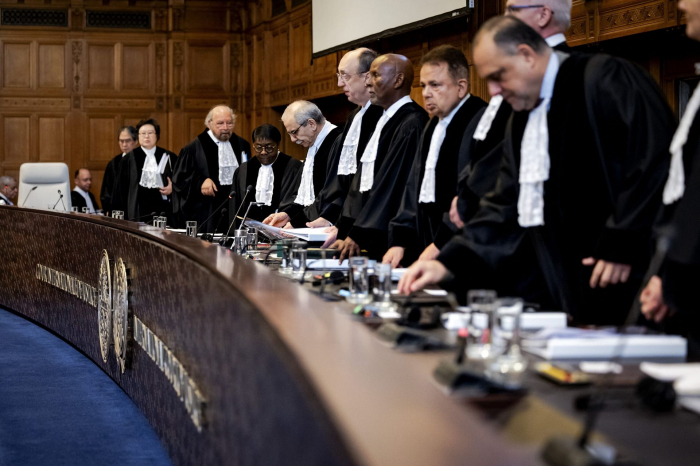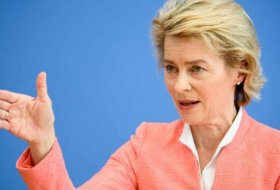Nicaragua’s case against Germany at the International Court of Justice (ICJ), in which the Central American country accuses Berlin of facilitating a “genocide” in Gaza, likely came at the behest of Russia, Western intelligence officials and diplomats said.
A detailed western intelligence assessment presented to POLITICO determined that Russia, which has close relations with Nicaragua’s authoritarian leaders, likely pushed their allies in Managua to use the so-called Genocide Convention of 1948 to pursue Germany at the ICJ.
The Nicaraguans “have no reason to inject themselves into a conflict over the Middle East,” one of the western intelligence officers said.
Nicaragua has long been a champion of the Palestinian cause, but its move against Germany, with which it has traditionally enjoyed amicable ties, shocked many observers in Berlin and beyond. Just a week before Nicaragua brought the case against Germany on March 1, the German foreign ministry described the relationship between the two countries as a “close friendship.”
Russian President Vladimir Putin may have had good reason to tinker with the court — and to employ his longstanding allies in Nicaragua to help.
The two countries have a deep connection. During the Cold War, the Soviet Union supported the leftist Sandinista rebels, who overthrew the Nicaraguan government in 1979. In recent years, Nicaraguan dictator Daniel Ortega has increasingly modelled his authoritarian regime on Russia’s, drawing inspiration in particular from Putin’s law on “foreign agents.”
In its case against Germany at the ICJ, Nicaragua argues that by exporting arms to Israel, Berlin made itself an accessory to the killing of civilians in Gaza.
Last month, Israeli Prime Minister Benjamin Netanyahu said some 13,000 Palestinian militants had been killed and estimated the civilian death rate to be 1-1.5 for every combatant since Israel launched its war on Hamas in Gaza in response to the Oct. 7 massacres. Local health authorities operating under the Hamas-run government say more than 34,000 Palestinians have been killed.
In January, South Africa accused Israel of committing genocide in a separate case at the ICJ. The court, in a preliminary ruling, did not accept the claim, though it did caution Israel to ensure that its forces don’t commit acts of genocide during the Gaza campaign.
Given that the ICJ hasn’t established that a genocide took place, legal experts say Germany can’t be guilty of acting as an accessory. What’s more, there is no precedent for accusing a third country of liability for war crimes committed by another.
Yet even if most legal scholars believe Nicaragua’s case is without merit, the charge of genocide at the U.N.’s highest judicial body is a humiliation for Berlin. Germany’s crimes against humanity during World War II are what led to the Genocide Convention to begin with, and it has spent decades trying to convince the world that it is adheres to the highest standards of human rights and international law.
For Putin, who seems to take a particular delight in trolling the Germans, humiliation may well have been part of the calculus.
Nicaragua shuttered its embassy in Berlin earlier this month as a result of the case. Neither the Nicaraguan mission to the United Nations in New York, nor its embassy in Vienna, which now covers Germany, responded to a request for comment.
Germany’s foreign ministry declined to comment on the record for this article.
Undermining the court
If Russia is behind the move, there was likely a more pressing motivation for putting Germany in the ICJ dock, according to the intelligence assessment: To try to undermine the court’s credibility in Western countries by making it a venue for specious legal arguments.
Russia has had a difficult time at the ICJ in recent years. Ukraine hauled Russia before the court after Moscow’s all-out invasion in February 2022. The court sided with Ukraine, ordering Moscow to “immediately suspend” its military operations, pending its final ruling.
Russia ignored the order — the ICJ has no ability to enforce its decisions — but the ruling continues to irk Moscow because it robs Putin’s regime of any pretense of international legitimacy for its war of aggression.
The core of Ukraine’s legal argument in that case is that Russia’s stated justification for the invasion — that ethnic Russians in eastern Ukraine were “subjected to bullying and genocide” by Kyiv — was a fabrication. Using that lie as justification for the invasion, Ukraine has argued, was itself a violation of the Genocide Convention.
Russia has had a difficult time at the ICJ in recent years. | Sem van der Wal/ANP/AFP via Getty Images
Russia dismissed Ukraine’s arguments, maintaining that the ICJ had no jurisdiction.
In early February, just weeks before Nicaragua submitted its case against Germany, the ICJ rejected Moscow’s objections, ruling that it did have jurisdiction. It has yet to issue a final ruling, however.
In the meantime, Moscow will use Nicaragua’s case against Germany and the separate genocide proceeding brought by South Africa against Israel to undermine the court’s legitimacy and argue through its propaganda channels that Russia is the victim of a double standard, the western officials said.
“Russia will say, ‘you’re pushing cases against us but are supporting Israel for the same thing,’” one of the officials said. “It undermines the authority of the ICJ.”
The views expressed in this article are those of the POLITICO and do not necessarily reflect the official policy or position of AzVision.az.
More about:
















































